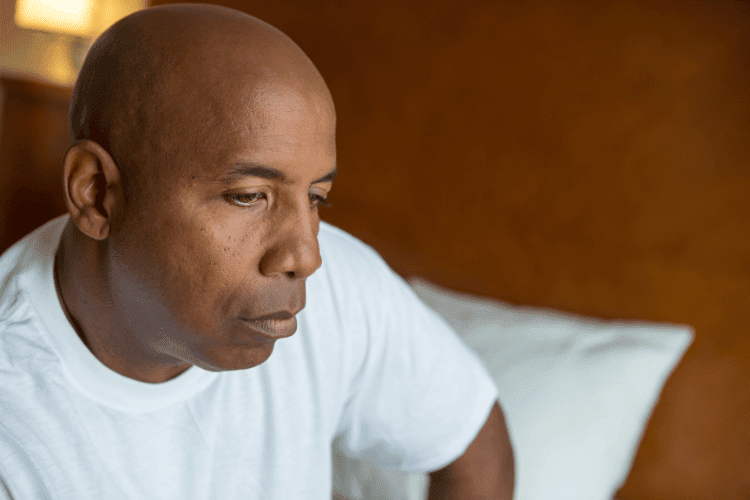Did you have a lucid dream and suddenly couldn’t breathe? It’s really unsettling, especially when you consider that lucid dreams are supposed to be a pleasant experience.
But what if you have the feeling you can’t breathe during a lucid dream. How common is this issue? Is there anything you can do to manage the situation, or better yet, avoid it?
Well, I’ve had some friends in different circles mention they had an episode where they can’t breath during a lucid dream and so decided to look more into the problem.
If you browse online lucid dreaming forums and communities, you’ll see lots of folks sharing stories that aren’t much different than yours.
Some say they feel like their body forgets to inhale the moment they drop into a lucid dream. Others wake up gasping for air after trying to control their dream surroundings.
Apparently, many of the problems popped up when people were trying to induce lucid dreaming. Yes, that’s a thing, and there are a few ways to go about it. The common ones are MILD techniques and reality testing, but we don’t need to dig deep into the tactics now.

Okay, so you’re not alone in this issue. But why is it happening in the first place if you can’t breath during a lucid dream?
There isn’t enough research to dig into just yet. However, we can check out some possible explanations.
Before assuming lucid dreaming is to blame, it’s wise to rule out
Left untreated, the apnea can do more damage than just ruin the fun of a lucid dream—it can impair sleep quality and is linked to serious health issues.
So, if you suspect that there’s something wrong, consult your physician and see if you need a sleep study. This is an overnight test that monitors breathing patterns, oxygen levels, and heart rate.
Don’t worry if the test shows that you do have a breathing issue. Healthcare providers can help people with
During the REM (rapid eye movement) stage, the body enters temporary paralysis called REM atonia to prevent us from acting out intense dreaming experiences.
While the atonia is a normal process, things get dicey when someone inexperienced goes into a lucid dream. Those new to lucid dreaming may panic when they realize they can’t move. As a result, they might feel like they’re gasping for air.
However, a Scientific Reports study looked into how dreams can cause irregularities during REM sleep. The results? Lucid dreamers might be able to control their breathing.
During the study, the participants were instructed to try and intentionally change dream activities to scenarios that would affect their breathing patterns. Think holding their breath or yodeling.
To my surprise, some of them successfully managed to alter their respiration behaviors!
The flip side here is that lower lucidity levels during REM sleep might translate to poor breathing and dream content control.
Overall, I think some lucid dreamers can learn to overcome the problem and manage their breathing long enough to keep the dream going. But novices may lack that control.

Typically, lucid dreaming is a positive and sometimes even fun experience!
Yet, it’s not impossible for things to go south. This would leave you with an unpleasant and incredibly vivid dream.
So, take a moment to think about the scenario that left you breathless. Was it stressful enough to mimic suffocation? That could be a very straightforward explanation right there.
The sensation is uncomfortable but not necessarily dangerous.
Just make sure that underlying conditions, like obstructive
Sometimes, breathing issues force people out of their lucid dreams. Especially if you can’t breath during a lucid dream.
That might be okay with some folks, but others would rather get their breathing under control to experience lucid dreams in full during the REM sleep period.
To make the experience as pleasant as possible, consider the following coping tactics:
Try to relax if breathing becomes difficult. Remind yourself the suffocating sensation isn’t a reality—your body is still inhaling air in real life.

It might help to work on changing the dream narrative to interrupt the panic.
Immerse yourself in a new scene or interact with other characters. This distraction could provide relief until the REM sleep cycle ends.
If you’re feeling breathless in a stressful lucid dream that you can’t control, try waking yourself up.
Calling out for help in the dream or trying to fall asleep within the nightmare scene can work. If that doesn’t work, blink repeatedly.
After you resolve the breathing issue, it’s important to note that there might be other risks associated with lucid dreams.
Potential risks include:
As long as the breathlessness sensation isn’t a result of a physical condition, like
It’s still a frightening experience, though.
So, if lucid dreaming frequently becomes too intense, consider stopping the induction techniques altogether. Remember that your priority should be getting a good night’s sleep!